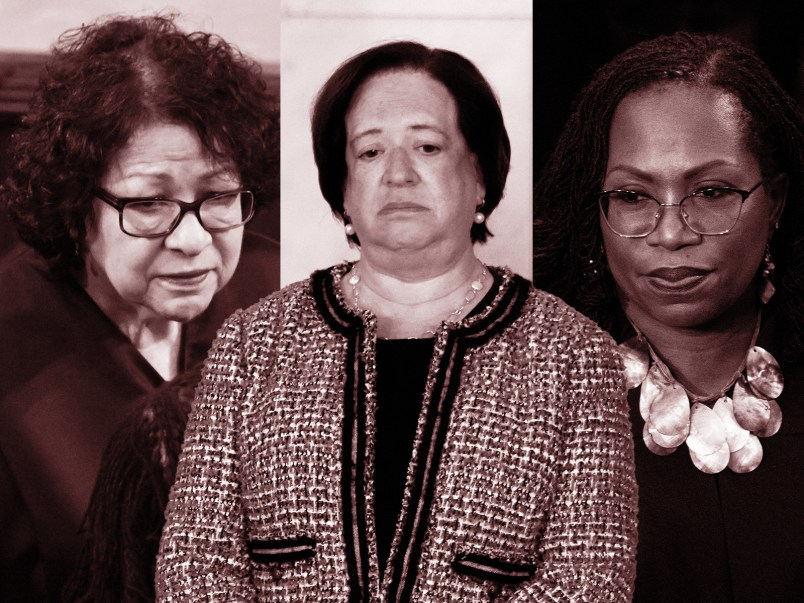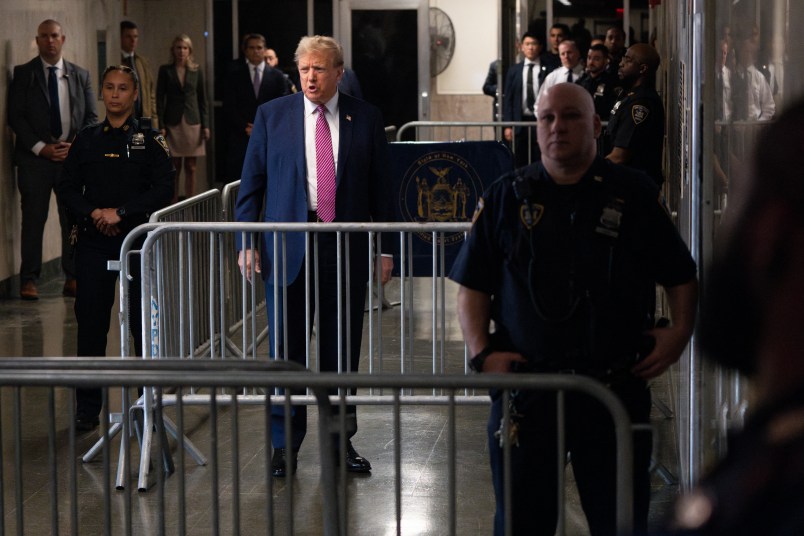The Senate confirmed Judge Amy Coney Barrett to the Supreme Court on Monday, making her the third Trump nominee to reach the high court.
Her confirmation is the culmination of the decades-long effort by the conservative legal movement to remake the federal judiciary in its image. By putting her on the court just a week before the election, Senate Republicans have prioritized those long term goals over the short term political price their vulnerable members may pay at the ballot box next week.
“A lot of what we’ve done over the last four years will be undone sooner or later by the next election,” Senate Majority Leader Mitch McConnell (R) said Sunday during a procedural vote setting up Barrett’s confirmation. “They won’t be able to do much about this for a long time to come.”
The final vote was 52-48, with no Senate Democrat voting in favor of her confirmation and only one Republican voting against it.
Barrett, who is 48 and is replacing the late liberal Justice Ruth Bader Ginsburg, could serve on the court for decades, and her addition to the bench cements a 6-3 conservative majority that will jerk the court’s jurisprudence even further to the right.
The way that President Trump — with crucial help from McConnell — has been able to shape the U.S. Supreme Court will have generational impacts. For two of the three vacancies he has been able to fill, Trump has put onto those seats justices well to the right of their predecessors.
Now, liberals will need to flip not just one, but two Republican-appointed justices to secure progressive victories. For years to come, Democrats will likely see their legislative agenda stymied by the courts.
Barrett’s last minute confirmation — which happened less than two months after Justice Ruth Bader Ginsburg died of cancer — has fueled demands from the left that Democrats expand the Supreme Court if they take the White House and the Senate, particularly because Barrett’s confirmation required Republicans to flip flop on previous promises to not fill vacancies that occur once presidential elections are underway.
A Favorite For Social Conservatives
A former clerk to the late Justice Antonin Scalia, Barrett’s status as a rising star in the conservative legal movement was crystalized during her 2017 confirmation to the U.S. Court of Appeals for the 7th Circuit.
Prior to that confirmation she was a law professor at Notre Dame University, where she burnished her social conservative credentials by joining University Faculty for Life, and speaking five times at a conference for law students aiming to promote a “distinctly Christian worldview in every area of law.” Once on the 7th Circuit, she established herself as one of the most conservative judges on the panel, particularly on civil rights cases.
Barrett’s name has been circulated as a potential Trump Supreme Court nominee for several years. She won right-wing acclaim during her appeals court confirmation hearing in 2017, during which Sen. Dianne Feinstein (D-CA), the top Judiciary Committee Democrat, remarked on her devout Catholic faith and told the future judge that the “dogma lives loudly within you.”
Republicans pounced on the comment as some supposed sign of anti-Catholic sentiment against Barrett. During her Supreme Court confirmation hearing, Republicans raised the specter of anti-Catholicism again, even though Democrats steered clear of mentioning her faith, focusing instead on policy issues she will likely weigh in on as a judge.
A Flashpoint for the 2020 Campaign
The potential that Barrett will cast deciding votes on cases dealing with the Affordable Care Act and reproductive rights became a key focus of her confirmation process and a touchy subject for the GOP senators who are in tight fights for reelection.
With a record of public statements and judicial actions reflecting a hostitlity to abortion rights, Barrett is seen as dependable vote for gutting legal projections for access to the procedure, if not reversing outright Roe v. Wade, the landmark decision establishing a constitutional right to an abortion. There are several cases traveling up the judicial pipeline that will give her and the other conservatives on the court the opportunity to do so.
The week after the election, the court will hear a legal challenge, supported by the Trump administration, to the Affordable Care Act, in which several red states are asking the court to fully dismantle the law. Because Chief Justice John Roberts — who voted with the liberals to uphold Obamacare in the past — will no longer be the deciding vote in that case, Democrats have painted Republicans’ vote to confirm Barrett has a vote to demolish the health care law.
Republicans, contradicting their longstanding promises to their conservative base, have played down the likelihood that Barrett will vote against Obamacare and to reverse Roe.
Sen. Susan Collins (R-ME), who faces a tough re-election, and who in the past has criticized her party’s hard stances against Obamacare and abortion, was the only Republican to vote no on the final vote to confirm Barrett.
A Coming Test On Election Disputes
Even before she faces any Obamacare or abortion cases, Barrett will face an early test in any election-related lawsuit that may end up before the Supreme Court. Already, the court has before it two disputes – out of North Carolina and Pennsylvania — over whether the deadlines by which mail-in ballots must be received should be extended.
Trump and his allies in Congress have made explicit that part of their goal in putting Barrett on the court before the election is to have her cast the deciding vote in any election disputes — including in a Bush v. Gore-like scenario in which the court is effectively deciding the presidential race.
Democrats, meanwhile, have called on Barrett to recuse from such cases.
Barrett dodged those questions during her confirmation hearings, making the stretch argument that such anodyne questions as whether a president should unequivocally commit to a peaceful transfer of power were political, and thus inappropriate for a judge to answer.
When Democrats tried to pin her down on whether she’d recuse if Trump refuses to accept an unfriendly election result and throws the case to the courts, she said only that she wouldn’t let herself be used as a “pawn” and would “faithfully apply the law of recusal.”
Barrett also largely feigned ignorance of Trump’s candor that he wants her installed on the bench quickly, possibly to give him a last-minute election assist.
“I think this will end up in the Supreme Court, and I think it’s very important that we have nine justices,” Trump told reporters late last month, referring to the election as a “scam Democrats are pulling.” A 4-4 split on the court, he added ominously, would not be a “good situation.”











